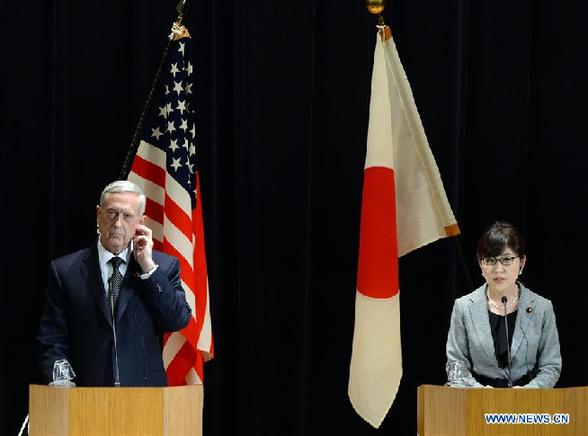The dogmatic defense doctrine from Mattis
- By Bishnu Hari Nepal
 0 Comment(s)
0 Comment(s) Print
Print E-mail China.org.cn, March 1, 2017
E-mail China.org.cn, March 1, 2017
"Be polite, be professional, but have a plan to kill everybody you meet"
-legendary US Marine Gen. James 'MadDog' Mattis, present US Defense Secretary of State
|
|
|
U.S. Defense Secretary James Mattis (L) attends a press conference with his Japanese counterpart Tomomi Inada in Tokyo, Japan, Feb. 4, 2017. (Xinhua/Ma Ping) |
The pages of recent history are very relevant to the new Cold War Doctrine propounded by U.S. Defense Secretary James Mattis during his East Asia visit in early February.
Instance One: The 1945 bombings of Hiroshima on August 6 and Nagasaki on August 9 ended an extremely dark chapter of human civilization. The United States had to use nuclear weapons for the one and only time to bring to an end years of Japanese aggression in China, Korea, South East Asia and beyond, in which China's resistance played an active strategic and military role.
Two: Despite best efforts, the U.S. was unable to destroy the North Korean government thanks to Chinese intervention during 1950-53 Korean War.
Three: A decade later, American troops intervened in the Indochina War to fight against the communist-led forces of North Vietnam, Laos and Cambodia. However, despite a huge advantage in military technology, they failed to prevail.
Notwithstanding the lessons provided by history, President Donald Trump chose East Asia to set out his new Cold War plans by sending Gen. Mattis to Seoul and Tokyo in February, the Defense Secretary's first foreign tour.
There was some speculation that Mattis would take the opportunity to gain acceptance for installation of the controversial anti-missile Terminal High Altitude Area Defense System (THAAD) and withdraw 28,500 U.S. military forces from Korea, along with elements of the Seventh Fleet and 50,000 troops from Japan as promised by Trump during his presidential campaign.
The most dangerous proposal made to Korea's acting President Hwang Kyo-ahn was the program to counter the perceived North Korean nuclear threat, even though there's no real evidence this would curb the North's nuclear provocation, but, rather would add oil to the fire concerning regional peace and security and be contradictory to developing a community of common destiny.
It is basically contradictory to Chinese President Xi Jinping's noble proposal of "total nuclear disarmament" and globalization in Davos at World Economic Forum on January 18, 2017. However, in regard to North Korea, China had already responded to Secretary of State Rex Tillerson's proposal and implementation of the United Nations Security Council sanctions by stopping buying coal from DPRK.
There's no doubt Trump's thinking is volatile and hostile to the interests of world peace. During the Conservative Political Action Conference (CPAC) on February 23, Steve Bannon, Trump's most influential advisor, insisted Trump didn't want to represent the entire globe, just America.
Contrary to a Trump election campaign promise, the U.S. so far hasn't asked Seoul to pay more than $900 million to sustain U.S. troops in Korea; instead, Mattis visited sensitive American bases and took a hardline on nuclear weapons.
Similarly, he supported an earlier decision to supply 16 F-35 jets to be stationed at the American Iwakuni airbase in Japan until at least June 2017, in place of F/A-18 Fighters and AV-8 Harrier Jets previously based there.
This strategy makes Japan the first foreign country to have F-35 Jets, adding fresh danger to East Asian peace and security. And, again, Trump hasn't sought to increase Japan's usual share of $4 billion towards the cost of maintaining American installations in mainland Japan and Okinawa.
Mattis, in quoting Article 5 of the U.S.-Japan Security Treaty in regard to the Diaoyu/Senkaku islands in the East China Sea, actually trampled on international law by neglecting the sovereign claims of China establishing over several centuries.
He also has negated the four-point 2014 reconciliatory initiatives for the peaceful resolution of China-Japan claims over these strategic islands. Naturally, China has had to speak out to safeguard her sovereignty in the East China Sea.
Dr. Bishnu Hari Nepal (@drbishnuhnepal) is a former Ambassador of Nepal in Japan, S. Korea, New Zealand, Fiji and Australia who now acts as a Consultant to Nepalese Peace, Conflict, International Relations and Development Studies.
Opinion articles reflect the views of their authors only, not necessarily those of China.org.cn.







Go to Forum >>0 Comment(s)